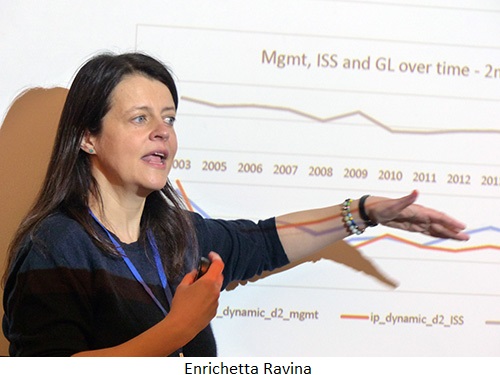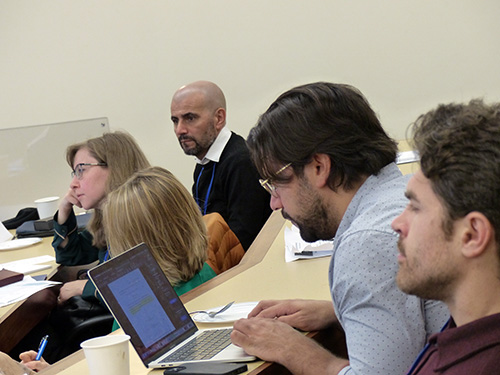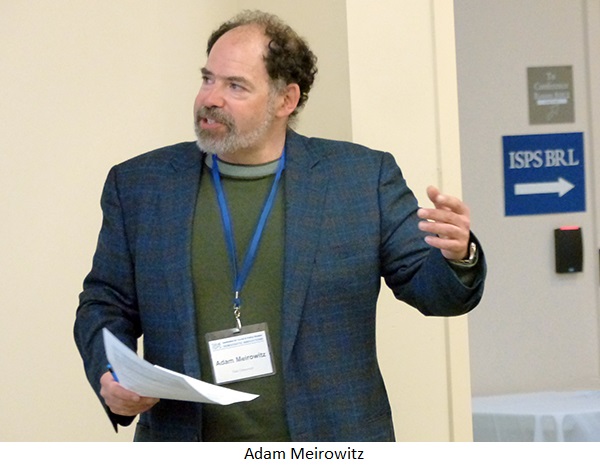ISPS Hosts Conference on Voting and Governance

Corporations are not people, but they are comprised of people. People who must govern themselves and sometimes vote to do so.
“Political scientists have been working on questions of voting and policy forever — these topics get at the very nature of democracy,” said Ethan Bueno de Mesquita, interim dean of the Harris School of Public Policy at the University of Chicago. “But these types of issues are super-relevant in industry and integrated corporate governance. And we are just beginning to understand how to ask and answer questions from this perspective.”
Bueno de Mesquita traveled to Yale last week for a conference on voting and governance, sponsored by the Institution for Social and Policy Studies’ new Democratic Innovations program and organized by ISPS fellow Adam Meirowitz, Damon Wells Professor of Political Science; Laurent Bouton, professor of economics at Georgetown University; and Shaoting Pi, assistant professor of finance at Iowa State University.
Democratic Innovations aims to identify and test new ideas for improving the quality of democratic representation and governance. The conference assembled experts in finance, economics, and political economy who study voting to better understand incentives and how well voting collects information and preferences.
“The world of finance has many elections, just like in politics,” said Nadya Malenko, associate professor of finance at the University of Michigan. “Research methods in the fields overlap, but there has traditionally been very little talking between the sides. This is the first conference to bring them together.”
Over two days, participants presented and discussed research papers on mutual fund voting in proxy contests, extreme agenda-setting power in dynamic bargaining games, information acquisition by investors prior to voting and trading, razor-thin elections, and the rise of corporate votes on environmental, social, and governance issues — collectively known as ESG.
“So much of corporate ownership is held by giant index investment companies like BlackRock and Vanguard,” Bueno de Mesquita said. “How they decide to vote their shares — for example, putting more emphasis on shareholder value or more emphasis on ESG issues — can have a huge influence on corporate behavior, economic outcomes, and even politics and public policy.”
This is particularly true because so few shareholders traditionally show up to vote, he said, raising tricky questions, such as: Who has the incentives concerning a particular issue? Will the votes matter? Should a large shareholder sell their votes? Can they sell their votes?
“To answer questions like this, it’s valuable to have expertise from different disciplines,” Bueno de Mesquita said. “We need to know what political scientists know about voting. We need finance people who know about money and stocks. We need law and governance people with knowledge about corporate structures and management.”
In addition to Malenko and Pi, speakers included Hulya Eraslan of Rice University, Gabriel Lopez-Moctezuma of the California Institute of Technology, Dan Bernhardt of the University of Illinois, Alon Brav of Duke University, Matias Iaryczower of Princeton University, John Duggan of the University of Rochester, Dimitrios Xefteris of the University of Cyprus, Lydia Mechtenberg of the University of Hamburg, Navin Kartik of Columbia University, Nolan McCarty of Princeton, Nicola Persico of Northwestern University’s Kellogg School of Management, Cesar Martinelli of George Mason University, Philip Bond of the University of Washington’s Foster School of Business, and Enrichetta Ravina, a senior economist with the Federal Reserve Bank of Chicago.
“The Democratic Innovations program aims to bring multidisciplinary perspectives to bear on fundamental questions about governance,” said ISPS Director Alan Gerber, Sterling Professor of Political Science. “It is great to host outstanding scholars working to identify key theoretical issues and provide important insights to guide governments, businesses, and organizations seeking to improve their governance.”
Each presentation featured incisive questions from across academic disciplines.
“I am tremendously happy with everyone’s investment in the conference,” Bouton said. “We had a high level of engagement that led to insightful discussions and great enthusiasm for launching projects in this interdisciplinary space.”
Malenko said she had arranged a possible collaboration with someone she met at the conference, hoping to learn more about applying research methods from the field of political economy to study corporate voting.
“Political economy literature regarding public elections is very developed over many decades,” she said. “The political economy of corporate elections is not as advanced a field because shareholder voting has become particularly important only in the last two decades. We are learning the methods from the political economy, but there are also some unique features of corporate elections not present in political elections, and that’s where the synergies are coming from.”
Meirowitz said he hopes to hold the conference again next year, exploring if there is more that political scientists can learn from the study of finance concerning issues that affect everyone.
“We are probably not going to solve all of our problems by political decisions alone,” he said. “It’s likely that private companies are going to have to make decisions with political impact.”
And it will be up to researchers like those assembled at ISPS last week to help us understand how those decisions might get made.
“There are terrific people here today, different worlds colliding,” Bueno de Mesquita said. “We just need to get to know each other.”